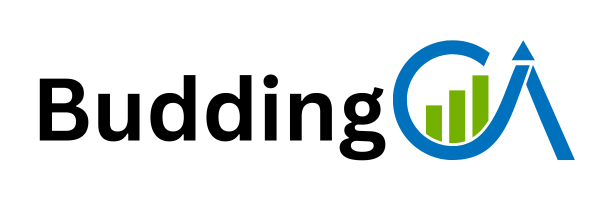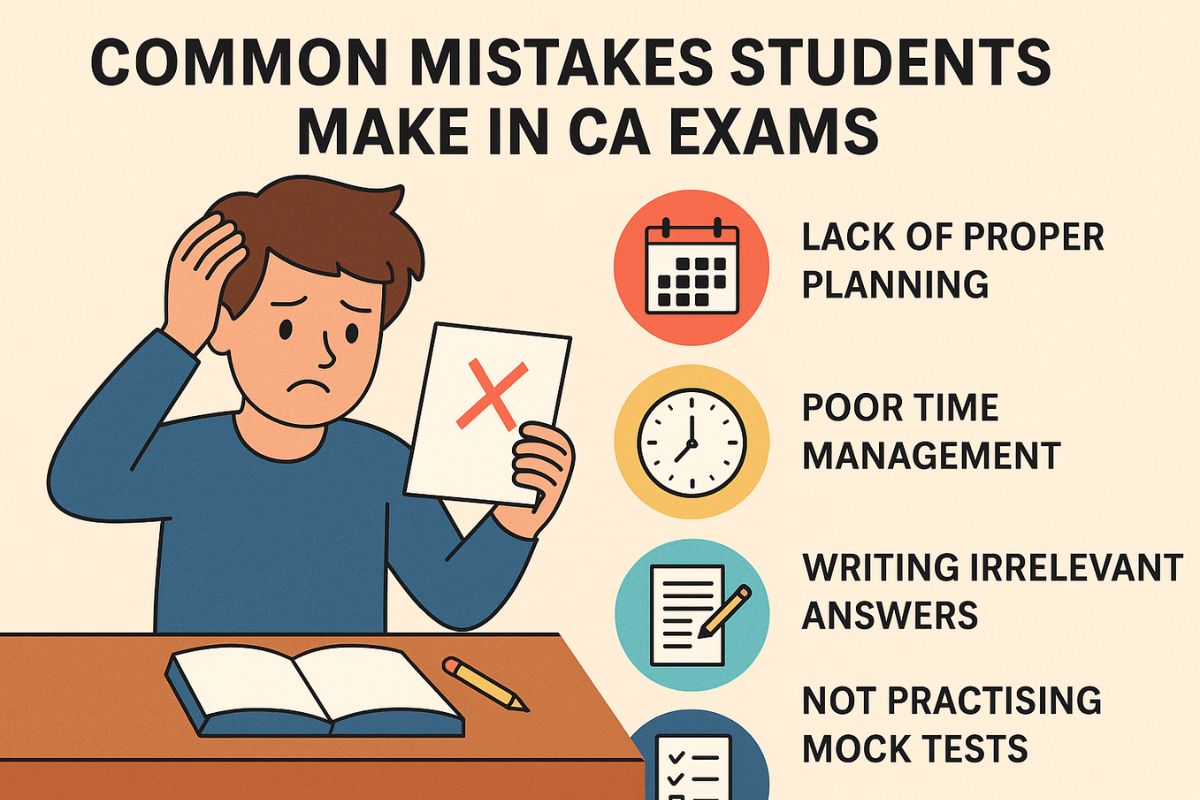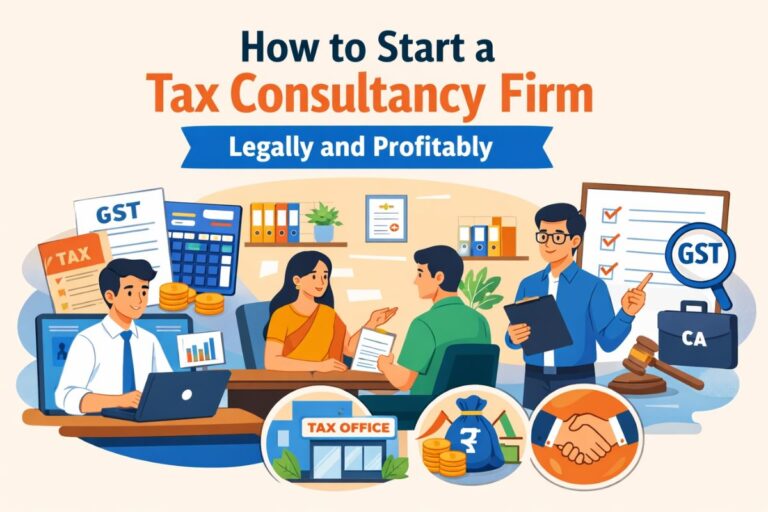Clearing CA exams is not just about how many hours you study but how smartly you prepare. Many students spend months with full dedication but still fall short of expectations. The reason is not always lack of hard work—it is often the result of avoidable mistakes.
If you are a CA aspirant, you must understand where most students go wrong. Identifying these common errors and learning how to avoid them will help you increase your chances of success.
This article will cover the major mistakes students make in CA exams and provide you with practical strategies to overcome them.
1. Lack of Proper Planning
One of the biggest mistakes is starting preparation without a clear plan. Many students open their books and study randomly without knowing what to prioritise. This approach wastes valuable time and leaves gaps in preparation.
How to Avoid
- Create a study timetable that covers all subjects and papers.
- Break down ICAI’s syllabus into small, achievable targets.
- Include time for revision and mock tests in your plan.
- Stick to the schedule but keep some buffer days for emergencies.
A planned approach not only gives you confidence but also ensures you don’t miss out on important topics.
2. Ignoring ICAI Study Material
Another common mistake is depending only on coaching notes or reference books. While those are helpful, ICAI’s own study material, RTPs (Revision Test Papers), and MTPs (Mock Test Papers) are the most authentic.
How to Avoid
- Always complete ICAI study material before moving to other sources.
- Practise past exam papers to understand how ICAI frames questions.
- Give special attention to ICAI RTPs since they often contain exam-relevant questions.
Remember, examiners evaluate based on ICAI’s own framework, so ignoring it can cost you marks.
3. Poor Time Management in Exam Hall
Many students know the answers but still fail to attempt the full paper. They spend too much time on one question and panic when time runs out.
How to Avoid
- Practise writing answers within a time limit at home.
- Divide exam time wisely: for a 100-mark paper, ideally spend 1.8 minutes per mark.
- Start with questions you are confident about.
- Keep at least 15 minutes in the end to revise and check your paper.
Finishing the paper on time gives you an edge, even if some answers are average.
4. Neglecting Theory Subjects
Many CA students focus more on practical subjects like Accounts, Costing, or Tax and ignore theory subjects such as Law or Audit. This imbalance reduces overall marks.
How to Avoid
- Treat theory subjects with equal importance.
- Instead of rote learning, focus on understanding concepts.
- Use mnemonics, flowcharts, and summaries to retain sections.
- Revise theory multiple times to keep it fresh in memory.
Balanced preparation is key because ICAI does not pass you based on a single subject but on aggregate marks.
5. Lack of Revision
Some students read the syllabus once and move on, thinking they will remember everything. But CA exams demand multiple revisions. Without revision, even the best-prepared students forget concepts during the exam.
How to Avoid
- Follow the 3-time revision rule:
- First revision: While completing syllabus.
- Second revision: At least one month before exam.
- Third revision: Just before exam day.
- Keep short notes and summaries for quick revision.
- Allocate the last 30-40 days mainly for revision and mock tests.
Revision is where knowledge becomes exam-ready.
6. Writing Irrelevant or Lengthy Answers
Many students believe writing lengthy answers fetches more marks. Some even beat around the bush when they don’t know the exact answer. Examiners do not give marks for unnecessary details.
How to Avoid
- Write to the point answers.
- Follow ICAI’s recommended presentation style:
- Use headings, bullet points, and short paragraphs.
- Highlight important sections and keywords.
- Practise writing case law-based answers with proper structure: facts, provisions, conclusion.
Quality matters more than quantity in CA exams.
7. Not Practising Mock Tests
Many students prepare well but never test themselves in exam-like conditions. This creates a gap between preparation and performance.
How to Avoid
- Solve at least 5-6 mock tests per subject before exams.
- Analyse mistakes and work on weak areas.
- Attempt mock tests at the same time as your actual exam timing to set your body clock.
Mock tests build exam temperament and confidence.
8. Over-Reliance on Last-Minute Study
Some students leave important chapters or attempt to cover the entire syllabus just before exams. This last-minute rush leads to confusion and stress.
How to Avoid
- Start preparation well in advance.
- Complete syllabus at least 1.5 months before exam.
- Use the last month only for revisions and test papers.
- Avoid learning new topics in the last 2-3 days. Stick to what you already know.
Consistency beats last-minute cramming.
9. Ignoring Health and Sleep
CA exams are mentally draining. Many students cut down on sleep, eat unhealthy food, and neglect exercise during preparation. This reduces focus and energy levels.
How to Avoid
- Sleep at least 6-7 hours daily.
- Eat light and balanced meals. Avoid junk food close to exams.
- Include short breaks and light exercise in your routine.
- Practise meditation or deep breathing to reduce stress.
A healthy body supports a sharp mind.
10. Fear of Failure and Overthinking
Many students fail not because of lack of knowledge but because of anxiety and self-doubt. Fear of failure prevents them from performing confidently in the exam hall.
How to Avoid
- Focus on preparation, not on fear.
- Use positive affirmations: remind yourself that you are capable.
- Avoid unnecessary comparisons with friends.
- Stay calm during the exam—if you don’t know a question, move ahead and come back later.
Confidence plays as much role as knowledge in CA exams.
11. Not Analysing Previous Attempts
Students who face repeated failures often repeat the same mistakes because they do not analyse where they went wrong.
How to Avoid
- Review your past mark sheets and examiner comments if available.
- Identify whether the issue was with time management, theory subjects, presentation, or lack of revision.
- Correct those mistakes in your next attempt instead of preparing blindly again.
Learning from failures is part of the CA journey.
12. Over-Dependence on Coaching
While coaching is helpful, relying completely on it is another mistake. Some students attend classes but never revise or practise on their own.
How to Avoid
- Treat coaching as a support system, not a replacement for self-study.
- Revise each class within 24 hours to strengthen memory.
- Practise questions on your own instead of only following what the faculty solves.
Self-study is the real key to success in CA exams.
13. Ignoring Presentation Skills
Examiners check hundreds of copies. Poor handwriting, unorganised answers, and lack of structure can cost you marks.
How to Avoid
- Practise neat handwriting and proper spacing.
- Use headings, bullet points, and diagrams wherever possible.
- Underline key words for better visibility.
- Start each new question on a fresh page.
A well-presented paper creates a positive impression and increases scoring chances.
14. Not Setting Realistic Targets
Some students burden themselves with unrealistic targets, like studying 16-18 hours daily. This leads to burnout and inconsistency.
How to Avoid
- Set achievable daily goals (e.g., 8-10 effective study hours).
- Use techniques like Pomodoro method to stay focused.
- Take short breaks between study sessions to refresh your mind.
Consistency matters more than extreme hours.
Conclusion
CA exams are tough, but they are not unbeatable. Most failures happen because students repeat common mistakes like lack of planning, poor time management, neglecting theory, or not revising properly. By being aware of these errors and making conscious efforts to avoid them, you can significantly improve your chances of clearing exams.
Approach your preparation with discipline, balance, and confidence. Use ICAI material as your base, revise multiple times, practise mock tests, and focus on your health. Most importantly, believe in yourself. With the right strategy, you can avoid these pitfalls and move closer to becoming a Chartered Accountant.
Calling all CA dreamers!
🔴 Are you tired of searching for the perfect articelship or job?
Well, fear no more! With 10K+ students and professionals already on board, you don't want to be left behind. Be a part of the biggest community around! Join the most reliable and fastest-growing community out there! ❤️
And guess what? It’s FREE 🤑
✅ Join our WhatsApp Group (Click Here) and Telegram Channel (Click Here) today for instant updates.




